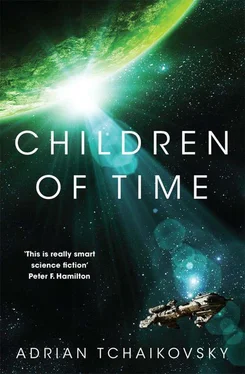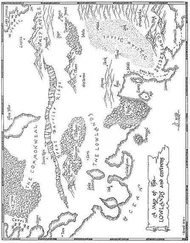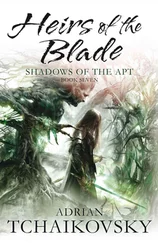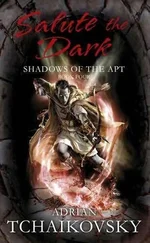They do not have to travel far to the north to see just what has been growing here at the edge of the Great Nest’s web of awareness. Soon they begin coming across felled trees – their trunks showing a combination of blackening, chewing and surprisingly clean cuts, often painstakingly scissored into sections. Frequently the entire root system has been unearthed as well, ensuring that nothing will regrow. The forest is under wide-scale attack, its fringes being gnawed away. Fabian can remember when there were more trees, he communicates. The clearing of land continues year to year, and Fabian’s inherited Understanding suggests that it is happening faster now than in his mother’s time.
Beyond that ragged edge, the other trees – the foreign trees – are set out in discrete stands. They are small and squat and bulbous, with fleshy leaves and trunks that are warty with protrusions. The exaggerated space between each copse is a firebreak – something the spiders are very familiar with. Their planet’s oxygen levels are higher than Earth’s – lightning-sparked fires are a constant threat.
What they are seeing is no work of nature. This is a plantation on a grand scale, and the labourers tending it are plainly visible. Everywhere Portia turns her eyes there are more of them and, if she looks beyond the chequerboard of groves, she can make out a steep-sided mound that must be the upper reaches of the plantation-owners’ colony, the bulk of it being hidden underground. A pall of smoke hangs over it like bad weather.
Portia’s kin are well aware that they are not the sole inheritors of their world. Whilst they cannot know how the nanovirus has been reshaping life here for millennia, there are certain species she shares the planet with, that her people recognize as something more than animals. The Spitters are a low-end example, barely removed from a state of brute nature, but to look into their small, weak eyes is nonetheless to recognize that here is a thing of intellect – and hence, danger.
The western oceans that Portia’s Great Nest looks over are home to a type of stomatopod with which her people have cautious, ritualized relations. Their ancestors were fierce, inventive hunters, equipped with unparalleled eyesight and deadly natural weapons, and used to living in colonies where negotiations over living space were common. They, too, proved fertile ground for the virus, and have developed on parallel lines with Portia’s own kin. Perhaps because of their aquatic environment, perhaps because they are by nature prone to wait for prey, their society is simple and primitive by Portia’s standards, but the two species have nothing to compete over, and in the littoral zone they sometimes swap gifts, the fruits of the land in exchange for the fruits of the sea.
Of more pressing concern are the ants.
Portia understands the nature of ants. There are colonies near the Great Nest, and she has both personal and genetically encoded dealings with them to draw upon. It is the Great Nest’s collective experience that ant colonies are complicated neighbours. They must be dealt with decisively – left to themselves they will always expand in a manner detrimental to any species that the ants themselves have no use for, which would naturally include Portia’s own. They can be destroyed – her inherited Understandings include chronicles of such conflicts – but war with even a small colony is costly and wasteful. Alternatively, preferably, they can be accommodated and limited by careful manipulation of their decisions.
Portia knows that ants are not like her people, nor like the Spitters or the stomatopods of the western shallows. She knows that individual ants themselves cannot be treated with, communicated with or even threatened. Her comprehension is coarse, of a necessity, but approximates to the truth. Each ant does not think. It has a complex set of responses based on a wide range of stimuli, many of which are themselves chemical messages produced by other ants in response to still more eventualities. There is no intelligence within a colony, but there is such a hierarchy of interacting and co-dependent instinct that it seems to Portia that some manner of entity is behind a colony’s actions and reactions.
With ants, the nanovirus has simultaneously failed and succeeded. Amongst the ants’ network of reactive decision making it has inculcated a strategy of experimentation and investigation that approaches rigorous scientific method, but it has not led to intellect such as any human or spider would recognize. Ant colonies evolve and adapt, throw up new castes, investigate and make use of resources, devise new technologies, refine them and interrelate them, and all this without anything approaching a consciousness to direct it. There is no hive mind, but there is a vast and flexible biological difference engine, a self-perfecting machine dedicated to the continuance of itself. It does not understand how what it does functions, but it constantly expands its behavioural repertoire and builds upon those trial-and-error paths that prove fruitful.
Portia’s understanding of all this is very limited, but she has a grasp of how ants do and do not work. She knows that individual ants cannot innovate, but that the colony can – in a strange way – make what appear to be informed decisions. Application of force and reward, a narrowing of the colony’s viable options so that the most advantageous is the one the spiders intend it to choose, can lead to a colony accepting boundaries on its territory and its place in the world, and even to become a productive partner. The colonies are perfect exponents of game theory: they will cooperate where that course is less costly and more beneficial than other strategies, such as all-out genocidal war.
The colonies that she is already familiar with, near Great Nest, are surely less than a tenth the size of what she is now looking at. Fabian explains that there were once several warring colonies here, but one has become dominant. Instead of driving its lesser neighbours to extinction, the ruling colony has incorporated them into its own survival strategy, permitting their continuance in return for making them into extensions of itself, utilizing food that they gather and technologies they have developed. It is this world’s first superstate.
Portia and the others have a brief, agitated conversation. This super-colony is far enough from Great Nest not to threaten it now, but they can look ahead and envisage that its very existence here endangers their people’s future. A solution must be found but, to think through a plan like that , Portia’s kin at home will need all the information she can bring back to them.
They are going to have to continue their journey into the land of the ants.
Fabian is surprisingly useful. He has travelled further than this himself; in fact his family makes a habit of it. It is dangerous, but they have developed ways of minimizing the risk of raising the alarm, and when hunting has been lean, the ants’ larders are a last resort.
A new column of ants has arrived, and they are here for timber. The spiders retreat further into the trees and watch as the insects set to work breaking up the already fallen trunks into manageable sections, using acid and the strength of their jaws. Portia is swift to spot something new: a caste that she has never seen before. Smaller branches are severed and carried off by unexceptional-seeming workers, but the large trunks are dealt with by ants with long, curved mandibles equipped with jagged inner edges. These they fix to the circumference of a trunk, and move their mouthparts in incremental opposition, scoring around and around so as to cut a circular section away. Those mandibles did not emerge from the cocoon with the rest of the ant, however. They gleam in the sunlight in a way quite unlike anything Portia has seen before: rigid, toothed sleeves that make remarkably quick work of biting and sawing the wood into pieces.
Читать дальше












